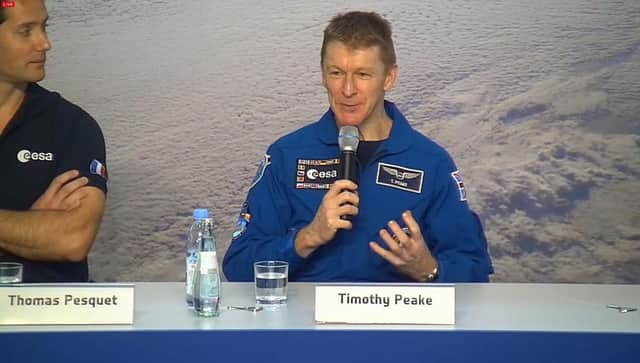I'd love to go back into space says Tim Peake


Speaking at his first press conference since leaving the International Space Station (ISS) and landing in Kazakhstan on Saturday, he also said he was “feeling fantastic”.
Major Peake, from Westbourne near Emsworth, described a series of adrenaline-pumping events including his tiny Soyuz capsule “tumbling” in space, watching a pyrotechnic display of sparks and flames during the fiery descent through the Earth’s atmosphere, and the sensation of “falling back to Earth” as the building G-force pushed him back in his seat.
Advertisement
Hide AdAdvertisement
Hide AdHe also spoke of his “dream” of going to the Moon, his hope that the UK continues to fund manned space missions - and his relief at using a gravity-assisted Earth toilet at last.
The 44-year-old father-of-two returned to Earth from a six-month European Space Agency (Esa) mission on the ISS with American Nasa astronaut Colonel Tim Kopra and Russian cosmonaut Yuri Malenchenko.
Their “descent module” - the only part of the three-section Soyuz TMA-19M spacecraft to complete the journey - parachuted down on to a remote spot on the vast Kazakhstan steppe at 10.15am UK time on Saturday.
All three men are now undergoing an intense programme of rehabilitation and tests to help them re-adjust to Earth gravity and show scientists how their bodies have stood the strain of 186 days in space.
Advertisement
Hide AdAdvertisement
Hide AdMajor Peake spoke in a packed briefing room at the European Astronaut Centre in Cologne, Germany, where the Esa’s astronaut activities are based.
He was treated to a standing ovation when he made his appearance as members of the audience clapped and cheered.
The former helicopter test pilot related the story of his journey home from the space station in dramatic detail.
One of the most “dynamic” moments came after undocking when the still-orbiting Soyuz was literally blasted apart with explosive bolts.
Advertisement
Hide AdAdvertisement
Hide AdMajor Peake said: “In my previous military career I’ve had the pleasure of flying some Russian military helicopters so I’m very familiar with Russian engineering and Russian technology, and it’s robust. It works very well but it’s very solid, and when a solid spacecraft is designed to break into three parts it doesn’t do it quietly. It does it with a number of pyrotechnic bolts that all go off one after the other, sounding like a very heavy machine gun.
“The spacecraft really does blow itself apart, which is really quite exciting ... These pyrotechnic bolts are only a few millimetres of metal away from your ear when they go off.”
During separation the crew are seated in the descent module, which measures little more than 6ft (1.8m) across.
The two other sections of the Soyuz - the spherical “orbital module” which provides extra living accommodation in orbit, and the “service module” housing propulsion and control systems - are discarded and allowed to burn up in the Earth’s atmosphere.
Advertisement
Hide AdAdvertisement
Hide AdFrom then on the landing capsule was “tumbling” high above the Earth as the crew waited to enter the atmosphere, said Major Peake.
As it shot through the atmosphere, the craft’s heat shield slowed its speed from 17,398mph (28,000kph) to 514mph (827kph) and raised the outside temperature to a scorching 1,600C (2,912F).
The British astronaut said he was treated to a firework display as he looked out of the window beside his head.
He said: “It’s great being sat next to the window because you’re able to look out ... I started seeing sparks and flames coming off because all the multi-layer insulation around the spacecraft is burning away. Again, it was very exciting to see that.”
Advertisement
Hide AdAdvertisement
Hide AdDescribing the plunge Earthwards, the astronaut added: “You’re down at almost 100km and I looked out the window having spent six months watching planet Earth from 400km in a very controlled attitude. To look out the window and see Earth approaching at 100km in what looked like a fairly uncontrolled attitude was really quite surprising. You really get a very strong sensation that you are just falling back to the planet.
“Then the Gs start to build up. You get plenty of time to get used to that but towards the end you are doing four to four-and-a-half Gs which, after six months of zero gravity, is quite a lot. So you’re having to control your breathing and work on that.
“The capsule gets very hot, extremely hot. You’re working hard against the G, you’re working hard against the heat. Your visors are down, you don’t have much ventilation inside; you’re having to read the systems as well and check the spacecraft. There’s an awful lot going on.”